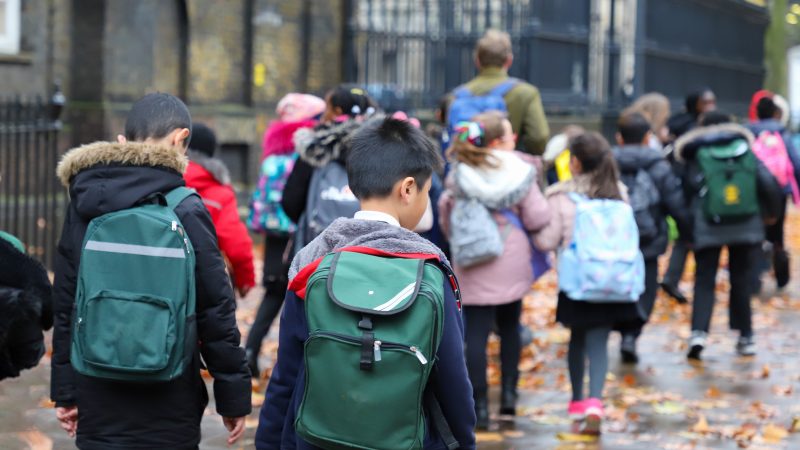
SPONSORED
The Secretary of State for Education has positioned attendance at school as ‘fundamental,’ with recent announcements calling on schools and parents to ‘double down’ on absence and get children back into the classroom.
Most current approaches to attendance, like fining parents for absence, place responsibility squarely on the child who is not in school and the parents or carers accountable for them.
And it’s easy to see why: every child who misses school has a unique story, often shaped by factors beyond the school gates – things schools cannot reasonably be expected to resolve.
But with one in five students, and one in three from disadvantaged backgrounds, now persistently absent – missing 10% or more of their schooldays – we can’t fix this problem one fine at a time. This is a systemic issue, and it requires a systemic solution.
It is now normal for pupils not to attend school every day
Our groundbreaking new research with Public First asked young people in Year 10 with different attendance rates and from different socio-economic backgrounds directly about why they’re missing school, and the response was sobering.
Despite having a strong sense of ambition and a clear desire to succeed in life, they told us that daily attendance is no longer a given: many pupils make an active decision each morning about whether to attend school. They weigh the value of school against other priorities – and school doesn’t always win.
What’s driving the attendance crisis?
Our research identified some key trends that were consistent across all absence rates and all socio-economic groups, several of which feel distinct to this moment in time.
First, school feels transactional: it’s all about attaining qualifications. For those with a clear idea about the future, the pressure of school, its rigid structure, and the relentless drive to exams is something to be tolerated. But with enrichment opportunities and spaces to socialise hollowed out, pupils, particularly those who don’t connect attendance to exam success or who believe they won’t achieve academically, feel they have little reason to go.
This view is reinforced by an online culture promoting alternative visions of future success completely disconnected from exams and grades – why worry about your GCSEs when you can become an influencer?
This digital world also contributes to another key factor young people cited for absence: exhaustion. Young people are worn down by the demand to be always “switched on,” often online socialising and supporting peers late into the night – a practice viewed as critical to how they form and maintain friendships. But this digital presenteeism undermines sleep and leaves them too exhausted for the demands of school, driving absence.
At the same time, many young people spoke openly about anxiety, stress, and burnout. They reported that schools don’t always take emotional health seriously, citing a lack of resources to offer adequate support and the rigid demands of school as a source of emotional distress. Likewise, while the threat of absence fines sometimes compel attendance, these types of punitive sanctions can also exacerbate feelings of distress and mistrust – pupils may be in school, but they don’t feel engaged.
Novel challenges require novel approaches
Against this backdrop, it should become clear that there can be no one-size-fits all intervention for attendance. Most of these issues are systemic, which is daunting – but it also provides us with a blueprint for action.
By addressing broader issues in the system, both government and schools can make a meaningful difference in attendance. Building time for in-person relationships into the school day, offering opportunities outside the classroom, and fostering trust between young people and teachers are all pathways to respond to today’s attendance crisis, as we try to tackle challenges unlike those we’ve faced in the past.
Looking toward solutions
With the help of our expert panellists, our event at Labour Party Conference, What Pupils Are Telling Us: Listening and Learning in the Attendance Crisis, will dive deeper into these solutions, exploring how schools and government can move beyond compliance and create environments that work with young people, not simply on them.
But one thing is already clear: our current system is not working.
We need a new approach, incentivising innovation around attendance to develop solutions fit for the present moment. And most importantly, we need to listen to, and learn from, young people in this attendance crisis – not as a problem to be solved, but as part of the solution.
READ MORE: Labour Party Conference 2025: Full LabourList events programme, revealed
Subscribe here to our daily newsletter roundup of Labour news, analysis and comment– and follow us on Bluesky, WhatsApp, X and Facebook.
Share your thoughts. Contribute on this story or tell your own by writing to our Editor. The best letters every week will be published on the site. Find out how to get your letter published.
- SHARE: If you have anything to share that we should be looking into or publishing about this story – or any other topic involving Labour– contact us (strictly anonymously if you wish) at [email protected].
- SUBSCRIBE: Sign up to LabourList’s morning email here for the best briefing on everything Labour, every weekday morning.
- DONATE: If you value our work, please chip in a few pounds a week and become one of our supporters, helping sustain and expand our coverage.
- PARTNER: If you or your organisation might be interested in partnering with us on sponsored events or projects, email [email protected].
- ADVERTISE: If your organisation would like to advertise or run sponsored pieces on LabourList‘s daily newsletter or website, contact our exclusive ad partners Total Politics at [email protected].




More from LabourList
Almost half of Labour members oppose plans to restrict jury trials, poll finds
‘How Labour can finally fix Britain’s 5G problem’
‘The University of the Air – celebrating 60 years of Harold Wilson and Jennie Lee’s vision’